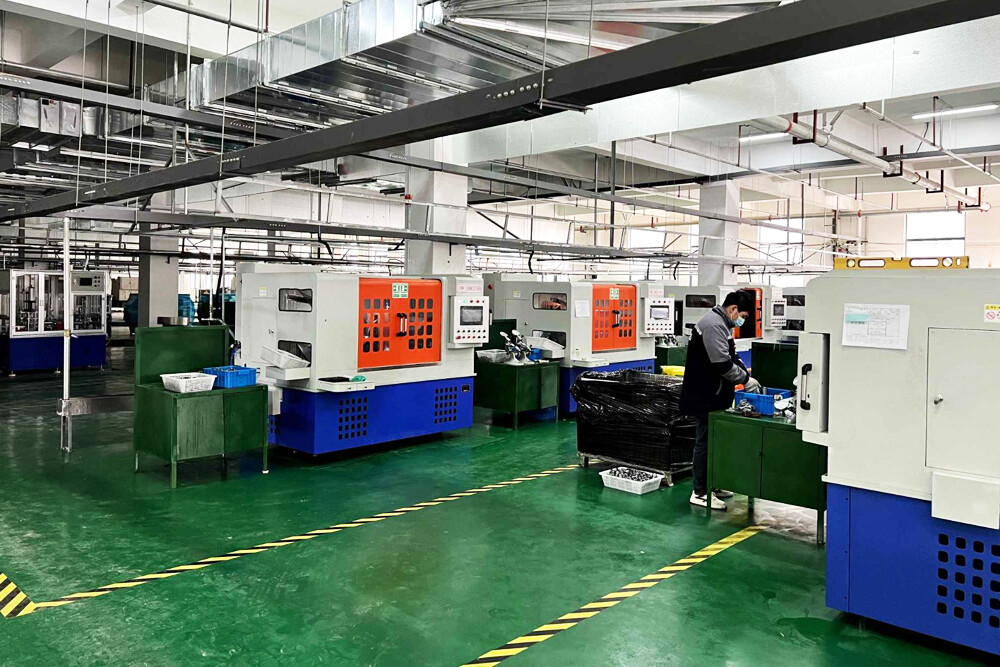
Bearing Manufacturer & Supplier
Specialize in ball bearings, roller bearings, thrust bearings, thin section bearings etc.
The Ultimate Guide to Tractor Bearings
In the field of agricultural machinery, tractors are one of the most critical pieces of equipment. Its performance and efficiency directly affect the planting and harvesting of crops. The efficient operation of a tractor is inseparable from the coordinated work of various mechanical components, among which the role of bearings is particularly important. Bearings are precision components installed on each rotating part of the tractor. Their basic function is mainly to support rotating parts and reduce direct contact friction between mechanical parts. By reducing friction, bearings help reduce energy consumption. High-quality bearings can withstand high loads and extreme operating conditions such as mud, dust and moisture, thereby increasing tractor performance and reliability. This blog aims to discuss the types, uses, selection criteria and maintenance of tractor bearings, and provide you with constructive suggestions.
Table of Contents
ToggleTypes of tractor bearings
In various tractor applications, such as tillage, seeding, harvesting, etc., bearings support the high-speed movement of components. Whether it’s the rotation of a wheel or the rapid movement of a robotic arm, good bearings are key to ensuring that these actions proceed smoothly. Therefore, the selection and maintenance of good bearings are directly related to the performance of the tractor and the overall efficiency of agricultural production. There are many types of bearings used in tractors, each with unique design features and specific application scenarios. Choosing the correct bearing type is critical to ensuring efficient operation and long-term durability of your tractor. Here are several common tractor bearing types and their applications:

One of the most important uses of ball bearings in agriculture is in tractors, which feature the use of spherical rolling elements in the bearing rings. This type of bearing can withstand radial and axial loads and is suitable for applications with higher speeds. In tractors, ball bearings are often used to support wheel axles and some small gears because they provide good smoothness of movement and high load-bearing capacity.
Needle roller bearings
Needle roller bearings are available in smaller diameters and longer lengths and are suitable for applications where space is limited but large loads need to be carried. In tractors, needle roller bearings are commonly used in connecting rods, gear pumps and clutch components.
Thrust bearings
Thrust bearings are specifically designed to carry axial loads, not radial loads. In tractors, thrust bearings are mainly used for components involving push and pull actions, such as certain components in the hydraulic system.
Roller bearings use cylindrical, tapered or spherical rollers and are better suited to carrying heavy loads than ball bearings. Roller bearings are divided into the following types:
Cylindrical roller bearings: suitable for applications with high radial loads, such as tractor gearboxes and engines.
Tapered roller bearings: Able to withstand radial and axial loads, commonly found in axles and driveshafts.
Spherical roller bearings: Designed to withstand misalignment and bending stresses, suitable for installation in tractor wheel bearing locations.
Composite bearings
Composite bearings are made from a variety of materials, often including metallic and non-metallic materials such as plastics or ceramics. This type of bearing is lightweight, corrosion-resistant, and has good self-lubricating properties, making it suitable for use in harsh agricultural environments. In tractors, composite bearings are used in areas with heavy contact with soil and moisture.




What are the uses of tractor bearings?
Tractors are complex mechanical components made up of multiple components and often require bearings during operation to ensure smooth and efficient operation. The following are common uses for bearings in tractors:
Engine
In tractor engines, bearings are used in the crankshaft and connecting rods to help reduce friction in motion, improving fuel efficiency and overall engine performance. Especially under high load and high-speed operation conditions, high-quality bearings can maintain the stability and durability of the engine.
Gearbox
A tractor’s transmission is a key part of its power transmission system, with bearings allowing the gears to rotate smoothly and transmit power efficiently. The use of highly wear-resistant rollers or ball bearings ensures that the transmission maintains good performance and response at different speeds.
Axle
The tractor’s axles carry the weight of the entire machine while also dealing with the impact of uneven ground. The bearings used on axles are usually roller bearings or tapered roller bearings that can withstand heavy loads. These bearings can effectively withstand heavy loads and shock loads and ensure stability.
Wheel bearings
Tractor wheel bearings must be able to withstand large radial and axial loads, especially when farming or transporting heavy loads. Spherical roller bearings and tapered roller bearings are common choices because they can adjust internal stress to suit different operating conditions.
Hydraulic system
Pumps and motors in hydraulic systems often use bearings to ensure efficient operation. These bearings require high precision and durability to handle the high pressures and continuous operation found in hydraulic systems.
PTO (power take-off shaft)
PTO is the component on the tractor that transmits power to other agricultural machinery. The bearings on this shaft need to be very reliable to ensure stable transmission of high torque and power. Roller bearings that can withstand high axial and radial loads are usually used.
Cooling system
The tractor’s cooling fan shaft also usually uses bearings to ensure that the fan can rotate smoothly, thereby effectively dissipating heat and preventing the engine from overheating. These bearings need to have good heat resistance and reliability.
How to choose tractor bearings?
Choosing a suitable bearing for a tractor requires comprehensive consideration of a variety of factors, including load capacity, rotational speed, working environment, etc. Here are a few key points to note when selecting tractor bearings:
Load-bearing capacity: Tractors may encounter heavy loads and shock loads under different operating conditions, so the bearings must have sufficient load-bearing capacity. For heavy-duty operations, it is usually appropriate to choose roller bearings with high load capacity.
Speed: Bearings should be designed to accommodate the maximum speed of tractor components. High-speed applications often require the use of carefully designed ball bearings to reduce friction and heat generation.
Metal bearings: have high load-carrying capacity and good thermal conductivity, suitable for high-speed and high-pressure applications. However, corrosion can occur in harsh environments and lubrication is often required to reduce wear.
Composite material bearings: Provide self-lubrication, strong corrosion resistance, lightweight, suitable for use in dusty or humid environments. But the load is low and it is not resistant to high temperatures.
Working environment: Tractors often operate in dusty, humid and temperature-changing environments. Bearings with good sealing performance and adaptability to harsh environments should be selected.
Tractor bearing maintenance tips
Regular inspections and cleaning;
Ensure proper lubrication;
In humid or chemical environments, additional corrosion protection measures should be taken;
Use professional tools to regularly check the function and condition of your bearings.
Conclusion
As an indispensable and important machinery in agricultural production, the performance and efficiency of tractors largely depend on the quality and maintenance of bearings. Reasonable selection and use of bearings are key to ensuring efficient and stable operation of the tractor. When selecting bearings, you need to consider various factors such as load capacity, rotation speed, and working environment. At the same time, select appropriate materials according to working conditions. For example, choose metal bearings in high load environments and composite bearings in dusty environments. In addition, regular maintenance, including inspection, cleaning, lubrication and timely replacement, is essential to extend bearing life, prevent mechanical failure and maintain tractor operating efficiency.
FAQ
1. What types of bearings are used in tractors?
Tractors typically use ball bearings, roller bearings, needle bearings, thrust bearings and composite bearing types, each with its specific application scenarios and advantages.
2. How to choose suitable tractor bearings?
When selecting tractor bearings, you need to consider the load-bearing capacity, rotation speed and working environment, and select suitable materials and bearings with good sealing properties.
3. How do tractor bearings need to be maintained?
Check and clean bearings regularly, ensure proper lubrication, take corrosion protection measures, and use professional tools to check bearing function and condition.






Aubearing: Professional tractor bearing manufacturer
Aubearing is a professional manufacturer dedicated to producing high-quality tractor bearings. With years of industry experience and advanced manufacturing technology, Aubearing provides reliable bearing solutions to the global agricultural machinery market. The following are several distinguishing features of Aubearing in tractor bearing manufacturing:
High quality raw materials
Aubearing selects high-quality raw materials for production to ensure that each bearing can maintain excellent performance in harsh agricultural environments. These materials include high-strength steel and wear-resistant composites that are capable of withstanding high loads and prolonged use.
Advanced manufacturing technology
The company adopts advanced manufacturing technology and strict quality control processes, and strives for perfection in every aspect, from material selection, processing and manufacturing to finished product testing. Aubearing has first-class production equipment and testing instruments to ensure that every bearing meets international standards.
Comprehensive product range
Aubearing offers many types of tractor bearings including ball bearings, roller bearings, needle bearings, thrust bearings, composite bearings, etc. Each bearing has its own specific design and application scenarios to meet the needs of different tractor components.
Customized solutions
Aubearing also offers custom bearing services based on the customer’s specific needs. Whether it is special dimensions, specific materials or unique design requirements, Aubearing’s technical team can provide professional solutions to ensure that the bearings can perfectly adapt to the customer’s application.
Professional technical support
Aubearing has an experienced technical support team that can provide customers with a full range of services from installation guidance, fault diagnosis to maintenance. The technical support team also regularly communicates with customers to understand the problems they encounter during use and provide effective solutions.
Global market and service network
Aubearing’s products are sold to many countries and regions around the world, and it has established an extensive market and service network. No matter where our customers are, Aubearing can quickly respond to their needs and provide timely after-sales service.
In short, Aubearing, as a professional tractor bearing manufacturer, has won the trust of many customers with its high-quality products, advanced technology, professional services and global market network. Whether in harsh agricultural environments or under high-load working conditions, Aubearing’s bearings can provide reliable support and excellent performance to help agricultural machinery operate efficiently.
